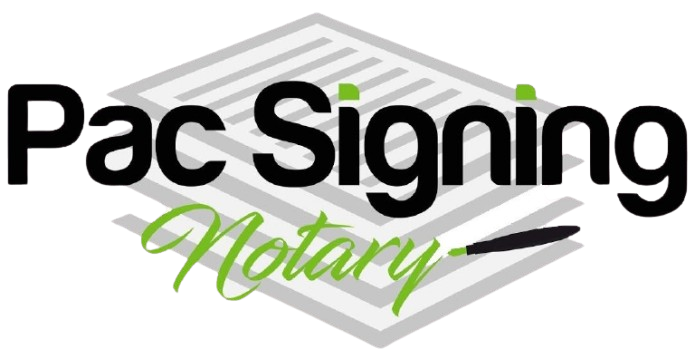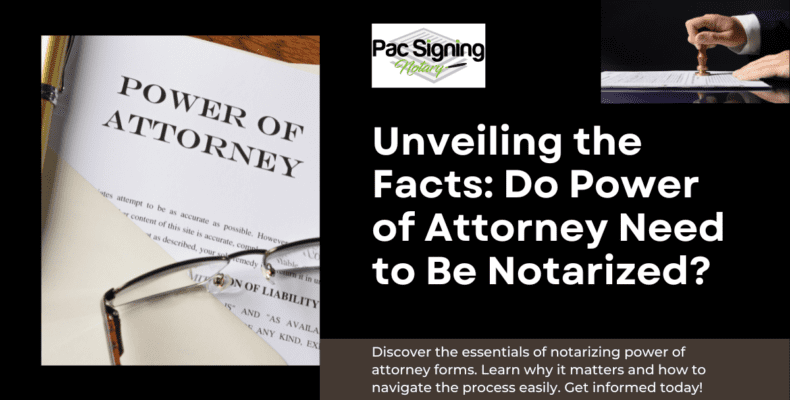Power of Attorney (POA) is a legal document that grants someone the authority to act on behalf of another person in various matters. Understanding the types of power of attorney and the importance of notarization is crucial for ensuring the validity and effectiveness of this legal instrument.
Types of Power of Attorney
General Power of Attorney:
This document grants the agent broad and comprehensive powers, allowing them to manage nearly all aspects of the principal’s affairs. It’s particularly useful in situations where the principal needs ongoing representation, such as handling financial transactions, legal matters, or business operations.
Limited or Specific Power of Attorney:
Unlike the general version, this type offers a more tailored approach. The principal specifies the exact powers granted to the agent, limiting their authority to certain actions or for a specific period. It’s a practical choice for one-off or time-limited tasks.
Durable Power of Attorney:
This type ensures that the agent’s authority persists even if the principal becomes incapacitated. It’s a proactive measure for long-term planning, allowing the agent to continue acting on behalf of the principal in the event of illness or disability.
Springing Power of Attorney:
Adding a layer of conditional activation, this type only comes into effect under specific circumstances outlined by the principal. Typically triggered by the principal’s incapacity, it provides an extra safeguard against potential misuse.
Medical or Healthcare Power of Attorney:
Focused on healthcare decisions, this document is crucial for situations where the principal may become unable to communicate their medical preferences. The agent is authorized to make healthcare decisions on behalf of the principal based on their wishes.
Financial Power of Attorney:
Specifically designed for financial matters, this document grants the agent the authority to handle the principal’s financial affairs. This can include managing bank accounts, making investments, and overseeing property transactions.
Does a Power of Attorney Need to be Notarized?
Enhanced Legitimacy and Recognition: Notarizing a power of attorney increases its legitimacy and the likelihood of recognition in legal proceedings. The notary’s seal is a powerful symbol of the document’s authenticity.
Legal Mandate: In many jurisdictions, notarization is a legal requirement for a power of attorney to be considered valid. This step is in place to prevent fraud and ensure the integrity of the document.
Why Notarize a Power of Attorney?
Fraud Prevention: Notaries play a crucial role in preventing fraud. By carefully verifying the identities of the parties involved, they add a layer of security, reducing the risk of unauthorized or fraudulent activities related to the power of attorney.
Ensuring Competence: Notaries often go beyond identity verification and may confirm that the principal is signing the document willingly and is mentally competent. This adds an extra layer of assurance regarding the voluntariness and legality of the agreement.
Legal Recognition and Acceptance: Notarizing a power of attorney is often a legal prerequisite for its recognition and acceptance in various legal proceedings. It solidifies the document’s status as a legally binding agreement.
Where to Get Power of Attorney Notarized?
Pac Signing Office:
Independent notaries or notary public offices specialize in notarizing documents. They are impartial professionals trained to perform notarial acts and are available for individuals seeking notarization services.
Banks:
Many banks offer notary services to their customers. This can be a convenient option for those who have accounts with a particular bank.
Law Offices:
Attorneys and law offices frequently provide notary services. Choosing a law office for notarization can offer the benefit of legal expertise during the process.
Steps to Notarize a Power of Attorney
Prepare the Document: Thoroughly complete all sections of the power of attorney document, ensuring accuracy and clarity in the language used.
Find a Notary: When seeking notarization, locate a notary public or a suitable notary service. Confirm their availability and any associated fees.
Provide Identification: Both the principal and the agent must present valid identification to the notary. This typically includes government-issued photo IDs such as a driver’s license or passport.
Sign the Document: In the presence of the notary, the principal signs the power of attorney document. The notary witnesses this process.
Notary’s Acknowledgment: The notary completes the acknowledgment section, affirming that the parties involved were present, identities were verified, and the signing was voluntary.
Notary’s Seal: The notary affixes their official seal to the document. This seal is a key element indicating that the document has been notarized.
Benefits of Notarizing a Power of Attorney
Legal Recognition: A notarized power of attorney holds higher legal standing and is more likely to be recognized in legal proceedings. This can be crucial for ensuring the document’s effectiveness.
Reduced Risk of Fraud: The notarization process, with its identity verification measures, significantly reduces the risk of fraudulent activities associated with the power of attorney.
Credibility and Trustworthiness: The notary’s seal lends credibility to the document, making it more trustworthy in the eyes of legal authorities, financial institutions, and other relevant parties.
Notarize a Power of Attorney with Pac Signing
Pac Signing is a reliable platform that facilitates online & Mobile notarization services, offering a convenient and secure way to notarize documents, including power of attorney. Users can explore this platform for a streamlined and efficient notarization experience.
FAQs
Is it Necessary to Notarize a Power of Attorney?
Yes, in many cases, notarization is a necessary step for a power of attorney to be legally valid and widely accepted.
Is Power of Attorney Valid Without a Notary?
While it may be valid in some instances, notarization significantly enhances its legal standing and acceptance in various contexts.
Can You Notarize the Power of Attorney for a Family Member?
In many cases, family members can act as notaries, but it’s essential to verify and comply with local regulations to ensure legal validity.
Can You Notarize Your Own Power of Attorney?
No, individuals cannot notarize their own power of attorney. The notary must be an impartial third party to ensure the document’s integrity.
Is Unregistered Power of Attorney Valid?
While an unregistered power of attorney may be legally valid, registration can provide additional legal advantages and protections, depending on the jurisdiction.
When Should I Register a Power of Attorney?
Register a power of attorney, especially when it involves significant financial or property transactions, to ensure legal recognition and protection of the agent’s authority.

